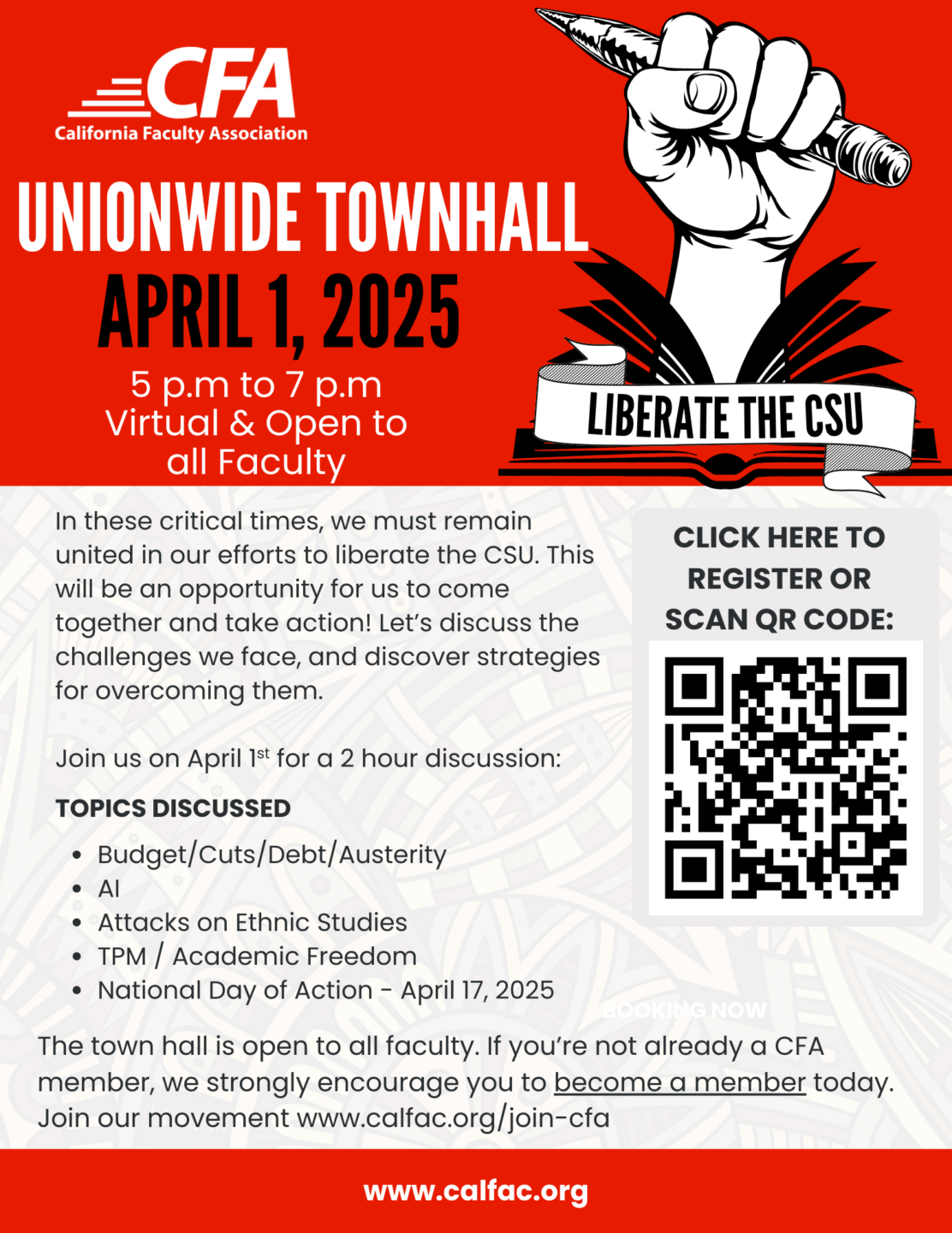Don’t Miss Our Second Unionwide Town Hall on Tuesday, April 1
Our first unionwide town hall on February 25 discussed the ongoing issues of layoffs and program cuts, A.I. in the workplace, and fighting ICE and immigration raids.
Given the enthusiasm but limited time frame during the first town hall, we will be holding a second unionwide town hall next Tuesday, April 1, from 5 p.m. to 7 p.m.

Please register here.
In just this past month, the political climate—both nationwide and within our own educational system—has continued to shift in a direction that poses a greater threat to the future of public higher education.
The Chancellor’s Office has been complicit and more than eager to prioritize mega-corporations by implementing a public-private initiative to make the CSU “the first A.I.-powered university.” This decision was made without the input of faculty, students, and staff. It also welcomes a host of environmental, racial, and gender justice issues into a system that is already battling existing prejudices that harm our communities.
“We need to teach technology as a social practice and how it affects our communities,” says UCLA Distinguished Professor Dr. Safiya Umoja Noble. “Everything we’re doing is a struggle over values. We don’t want an unbiased A.I. We want to prioritize people in the most generous way possible. Yet, we have these systems that come along and promise something that is impossible to deliver on. Educators need to educate, not A.I.”
Adding to this concern is the CSU administration’s pattern of laying off faculty and staff and closing academic programs—all the while funnelings hundreds of millions of dollars to themselves, their consultants, and private interest groups who have overrun the CSU. These drastic cuts are happening at CSU East Bay; you can sign the petition here to avoid cuts essential to instruction. Management’s level of antipathy has not gone unnoticed, yet it continues to go unchecked, putting the integrity of the CSU system at serious risk.
Despite Chancellor García’s recent appearances at the Social Mobility Symposium and at a CSU alumni reception , her words of support for students are at deep odds with what she is doing to support their learning. She has consistently failed to include faculty, students, and staff in any conversations, and—along with the CSU Board of Trustees—raised student tuition and fees, and restructured the CSU in a way that prioritizes corporate interests and profit over education.
Rather than offering aid to students and faculty who peacefully rallied to protect our immigrant and mixed-status students from ICE raids, CSU administrators were quick to issue Time, Place, and Manner violations at the very campus where García was speaking. One student who participated in the rally was fired from her campus job and her internship. This was a deliberate display of power and sent a chilling message to those who dare to challenge the status quo.
The ongoing harm is exacerbated by the Trump administration’s efforts to erase the histories of marginalized and underrepresented people. The US Department of Education recently announced it was investigating 45 universities, accusing them of engaging in what it calls “race-exclusionary practices.” This is part of a broader attempt by the administration to ban DEI initiatives. Many universities, fearful of losing federal funding, have paused their DEI efforts or completely eliminated any references to DEI from its communications and programs.
We have seen troubling attempts of ICE, in collaboration with diverted federal officials from other agencies and a newly formed Joint Task Force to Combat Anti-Semitism, targeting student activists. Columbia University student Mahmoud Khalil and Cornell University student Momodou Taal are among two activists being threatened with deportation due to their pro-Palestine protests on campus.
It is imperative that we, as faculty, show our solidarity in resisting authoritarianism and the corporatization of our public higher education system. While we may not always agree on the specifics of how to address these challenges, those of us that care deeply for democratic values and protecting our students recognize that free speech repression and lack of transparency and accountability cannot be justified.
Please join us on April 1 as we come together to discuss these important concerns. Based on feedback from our last town hall, we will allocate more time for conversation to engage in strategies for overcoming these issues.
Join California Faculty Association
Join thousands of instructional faculty, librarians, counselors, and coaches to protect academic freedom, faculty rights, safe workplaces, higher education, student learning, and fight for racial and social justice.